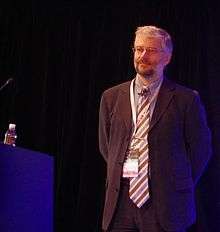Igor Muttik

Igor Muttik (born 1962 in Russia) is a computer security expert, researcher and inventor.
Career
Dr. Igor Muttik is a Senior Principal Research Architect with McAfee which is part of Intel Corporation since 2011. He started researching computer malware in 1980s when anti-virus industry was in its infancy. Muttik holds a PhD degree in physics and mathematics from the Moscow State University. He is a member of CARO (Computer Antivirus Research Organization) since 1994, lives in the UK and worked as a virus researcher for Dr. Solomon’s Software. Since 1998 Muttik was running McAfee’s anti-malware research in EMEA and switched to his architectural role in 2002.
In 2008 he was one of the co-founders of AMTSO[1] (Anti-Malware Testing Standards Organization) and was on the Board of AMTSO for 3 years. Muttik was also a co-founder of Industry Connections Security Group [2] (ICSG is part of IEEE) - he is the chair of the taggant system working group,[3] vice-chair of the ICSG[2] and CMX (clean file metadata exchange) working groups.[4] The taggant system and CMX are both part of AMSS (Anti-Malware Support Service).[5]
He is a regular speaker at major international security conferences like Black Hat Briefings,[6][7][8] RSA Conference, DEF CON,[9] Virus Bulletin, EICAR.
Muttik is a visiting professor at the Information Security Group[10] at Royal Holloway University London. He is heading McAfee's work for the security research of mobile devices funded by EPSRC:[11] MobSec,[12][13] ACID[14] and AppGuarden [15] projects. His current work is focused on the architecture of security solutions for smart devices and on hardware-assisted security technologies.
Packer controversy
In May 2009 Muttik's blog about the risks associated with the use of software packers caused criticism by Rob Rosenberger.[16][17] Despite this incident Muttik is working closely today with several software companies developing software packers (like Themida) on the taggant system.
See also
References
- ↑ "AMTSO (Anti-Malware Testing Standards Organization)".
- 1 2 "ICSG IEEE (Industry Connections Security Group)".
- ↑ "Taggant System by ICSG IEEE".
- ↑ "CMX System by ICSG IEEE" (PDF).
- ↑ "AMSS ICSG (Anti-Malware Support Service by ICSG IEEE)".
- ↑ "BlackHat presentation 2011" (PDF).
- ↑ "BlackHat speakers 2013".
- ↑ "BlackHat speakers 2014".
- ↑ "DefCon recording".
- ↑ "RHUL ISG Visiting Staff".
- ↑ "Fighting the rise of the app attackers".
- ↑ "EPSRC MobSec project".
- ↑ "RHUL ISG S2Lab MobSec project".
- ↑ "EPSRC ACID project".
- ↑ "EPSRC App Guarden project".
- ↑ "Rob Rosenberger's blog".
- ↑ "Mary Landesman's blog".
External links
- Issued USPTO patents
- AMTSO resources
- Virus Bulletin resources
- Muttik's publications (covering research in solid state physics, anti-malware and in security industry collaboration)
- Personal Web page